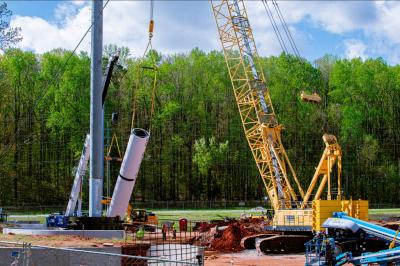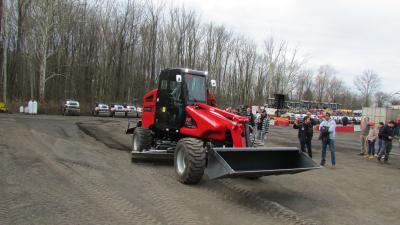Build a better mousetrap and the world will beat a path to your door. Use a better crusher and the world will beat a path to your dealer’s door.
That’s what Jim McGee of Adirondack Portable Custom Crushing in Warrensburg, N.Y., discovered.
He was working on a job site with Don Kingsley of Don Kingsley Excavating LLC in Bolton Landing, N.Y. They were screening/crushing subcontractors at the Kings Quarters Townhouse in Kingsbury, N.Y., preparing the 145-acre site for phase one of a four-phase townhouse construction project. This phase involved building 15 three-unit town houses.
For phase one, Don Kingsley Excavating was charged with land clearing, site profiling, excavating the basements, which were each about 20 by 60 by 9 ft. (6 by 18 by 3 m) deep and digging the footers for each building. It also was responsible for crushing 224,000 tons (203,209 t) of blasted rock.
Adirondack also was crushing a significant amount of rock, including 64,000 tons (58,060 t) of limestone. But both companies were facing a challenge.
“The biggest problem I have on this project is the quantity of soil that is mixed in with the rock,” said Jim McGee, owner of Adirondack Portable Custom Crushing. “With so much soil combined with the rock, the excavator operator cannot always determine if oversize rock pieces are being fed to the jaw crusher.”
Fortunately, Adirondack’s Fintec 1107 jaw crusher had a feature to assist with this problem. It used a side-delivery conveyor to segregate dirt from crushable rock. The dirt was sent through the crusher and clean rock was delivered to the company’s Fintec 1080 cone crusher. This allowed Adirondack to crush approximately 200 tons (181 t) of rock per hour.
Don Kingsley’s plant did not have this feature. It was crushing 130 to 160 tons (118 to 145 t) per hour of rock that was the same size as the rock being fed to Adirondack’s machine.
In mid-project, Don Kingsley, owner of Don Kingsley Excavating LLC, ordered a Fintec 1107 jaw crusher from Capitol Equipment Inc. of Mechanicville, N.Y.
McGee also rents his Fintec equipment from Capitol Equipment Inc. of Mechanicville, N.Y., because they give him “outstanding service at competitive prices.”
“I was looking for a better mousetrap and I could see the better one was McGee’s portable jaw crusher,” said Kingsley. “That is when I decided to switch plants for continuing the crushing.”
Now Kingsley also is enjoying high productivity. He said the side-delivery conveyor is the biggest difference between the two plants. The old plant could not efficiently handle or separate the dirt mixed in with the rock as well as the Fintec can.
Kingsley has taken his decision to change portable crushing plants very seriously. He purchased the plant to widen the crushing services offered by his company, which will include construction materials as well as recycling of materials from demolished buildings. As he expands the crushing side of his business, he projects a greater demand for the crusher.
Preventing Jams
Another problem was oversize rock.
“The blasting contractor is blasting the most economical way he can, so there are quite a few oversize rock pieces produced,” McGee said.
McGee said using an oversize jaw crusher to address the problem would not be feasible. It would be too time-consuming to mobilize a big crusher from site to site, and the oversize jaw crusher would be a fuel-guzzler, making it very expensive when its cost was prorated over the tons of rock crushed. In addition, the cost of ownership or the rental fee would be too expensive to pass on to the customer.
But the Fintec crusher had a feature to handle the oversize rock. As soon as the rock started to jam the crusher, the operator could hit a switch to reverse the jaw action, loosening the rock from the jaws and giving the crushing action another go.
“If we did not have the jaw’s reverse-direction system, it would jam the crusher five to 10 times a day and we would lose production time while having to wrap chains around the rock to pull it out of the crusher,” McGee said.
The jaw crusher predominately took 20-in. (51 cm) minus (oversize rock excluded) and crushed it to 6-in. (15 cm) minus. The 6-in. minus went directly from the jaw crusher conveyor to the cone crusher for making 2-in. (5 cm) minus stone.
The stone was to be used as road base on the project and for other onsite applications where fill was needed.
McGee said the Fintecs’ productivity could be even higher under better conditions. He used the machines to crush 60,000 tons (54,431 t) of clean quarry rock at an average throughput rate of 300 tons (272 t) per hour at the Barton Mines in North River, N.Y., where garnet is mined.
“I was very pleased with the crushing production. What helped to get such good production was the blasted rock that was optimally fragmented for efficient crushing throughput. I have operated and fixed many portable plant crushers in the past and I must say, this Fintec crusher is the best of them all,” said McGee.
McGee also said that, if it were not slowed down by the feed to the cone crusher and the fact that there is no surge pile to compensate, the Fintec 1107 jaw crusher would be capable of producing 250 to 275 tons (227 to 249 t) per hour.
Portable Crushers Combat Fuel Prices
CW Custom Builders LLC, the owner of the project, decided to crush rock on site instead of hauling it off site. It wanted to keep costs to a minimum by avoiding excess fuel charges.
In years past, the common method of dealing with rock in the Adirondack area was to drill, blast, excavate and export it by truck to whomever and wherever it could be dumped.
If it was close enough to a quarry or crushing/screening yard it could often be dumped there for crushing. Crushed rock was then imported from the same quarry to construct the road’s subbase, backfill utilities trenches and fill below-grade areas.
Portable crushing/screening plants have been on the market for many years, but in the past, they were used mostly to crush concrete, brick and asphalt as found on construction and demolition sites. Crushing/screening rock was not the main reason contractors were purchasing portable plants.
But exporting/importing rock to job sites by dump truck is increasingly expensive because of rising diesel fuel prices, making hauling a sobering cost consideration. Hauling the rock in a typical tri-axle dump truck usually means fuel consumption at the rate of 6 mpg or less, depending on traffic.
In recent years, there has been a strong interest in keeping as much excavated rock on site as possible to avoid added fuel costs. Thus portable crushers have become increasingly popular. The rock is crushed on site and used as road base or general fill.
Portable and Powerful
Adirondack Portable Custom Crushing did not always use a Fintec 1107 and Fintec 1080. McGee started as a construction-equipment repairman 20 years ago. In 1998, he started his own custom crushing/screening business. The business owned other machines, including an older portable crushing/screening system that was still usable at the time the Kings Quarters project was started, but the machine required five trucks and two days to move it only 30 mi., and it took the same time and labor to move it to another pit.
McGee doesn’t like to depend on this equipment for onsite projects. Adirondack goes as far as North Carolina to crush rock and its southern work is carried out during the severe winter months in upper New York, so the company needed to use crushers that were easy to transport. The Fintecs are simple to prep, according to McGee. It takes as little as one hour to do so.
The manufacturer of the equipment, Fintec Crushing & Screening Ltd. is fully owned by the Sandvik Mining and Construction Group of Sandvik AB.
For more information, visit www.fintec.com.
Today's top stories















